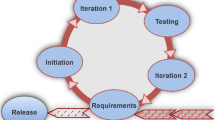Abstract
This paper describes a case study of software engineers developing a library of software components for a group of research scientists, using a traditional, staged, document-led methodology. The case study reveals two problems with the use of the methodology. The first is that it demands an upfront articulation of requirements, whereas the scientists had experience, and hence expectations, of emergent requirements; the second is that the project documentation does not suffice to construct a shared understanding. Reflecting on our case study, we discuss whether combining agile elements with a traditional methodology might have alleviated these problems. We then argue that the rich picture painted by the case study, and the reflections on methodology that it inspires, has a relevance that reaches beyond the original context of the study.
Similar content being viewed by others
References
Bache, E. 2003. Building software for scientists—a report about incremental adoption of XP. Poster presented at XP2003, Genoa, Italy.
Beck, K. 2000. Extreme Programming Explained: Embrace Change. Boston, MA: Addison-Wesley.
Boehm, B. 2002. Get ready for agile methods, with care. IEEE Computer 35(1): 64–69.
Boehm, B., and Turner, R. 2004. Balancing Agility and Discipline. Boston, MA: Addison-Wesley.
Bratthall, L., and Jorgensen, M. 2002. Can you trust a single data source exploratory software engineering case study? Empirical Software Engineering 7: 9–26.
Cockburn, A. 2002. Agile Software Development. Boston, MA: Addison-Wesley.
Cockburn, A., and Williams, L. 2001. The costs and benefits of pair programming. In: G. Succi and M. Marchesi, (eds.), Extreme Programming Examined. Reading, MA: Addison-Wesley.
DeMarco, T., and Boehm, B. 2002. The agile methods fray. IEEE Computer 35(6): 90–92.
Fitzgerald, B. 1998. An empirical investigation into the adoption of system development methodologies. Information and Management 34: 317–328.
Glass, R. 2002. Searching for the Holy Grail of software engineering. Communications of the ACM 45(5): 15–16.
Glass, R. L., Vessey, I., and Ramesh, V. 2002. Research in software engineering: an analysis of the literature. Information and Software Technology 44: 491–506.
Klein, H. K., and Myers, M. D. 1999. A set of principles for conducting and evaluating interpretive field studies in information systems. MIS Quarterly 23(1): 67–93.
Lanubile, F. 1997. Empirical evaluation of software maintenance technologies. Empirical Software Engineering 2: 97–108.
Lee, A. S. 1989. A scientific methodology for MIS case studies. Management and Information Systems Quarterly 13(1): 33–50.
Paulk, M. 2002. Agile methodologies and Process Discipline. Crosstalk, The Journal of Defense Software Engineering 15(10): 15–18.
Robinson, H., Hall, P., Hovenden, F., and Rachel, J. 1998. Postmodern software development. The Computer Journal 41(6): 363–375.
Robinson, H., Segal, J., and Sharp, H. 2003. The case for empirical studies of the practice of software development. In: A. Jedlitscha and M. Ciolkowski, (eds.), Proceedings of the 2nd Workshop in the Workshop Series on Empirical Studies in Empirical Software Engineering, pp. 99–108.
Seaman, C. 1999. Methods in empirical studies of software engineering. IEEE Transactions on Software Engineering 25(4): 557–572.
Segal, J. 2004. The nature of evidence in empirical software engineering. In Proceedings of the International Workshop on Software Technology and Engineering Practice (STEP) 2003, IEEE Computer Society Press, pp. 40–47.
Segal, J., Grinyer, A., and Sharp, H. 2005. The type of evidence produced by empirical software engineers. In Proceedings of the Workshop on Realizing Evidence-Based Software Engineering, ICSE-2005, http://portal.acm.org/dl.cfm
Wood, W. A., and Kleb, W. L. 2003. Exploring XP for scientific research. IEEE Software 20(3): 30–36.
Zelkowitz, M. V., Wallace, D. R., and Binkley, D. W. 2002. Experimental validation of new software technology. In: N. Juristo and A. M. Moreno, (eds.), Lecture Notes on Empirical Software Engineering, World Scientific Publishing Co, pp. 229–263.
Author information
Authors and Affiliations
Corresponding author
Rights and permissions
About this article
Cite this article
Segal, J. When Software Engineers Met Research Scientists: A Case Study. Empir Software Eng 10, 517–536 (2005). https://doi.org/10.1007/s10664-005-3865-y
Published:
Issue Date:
DOI: https://doi.org/10.1007/s10664-005-3865-y




